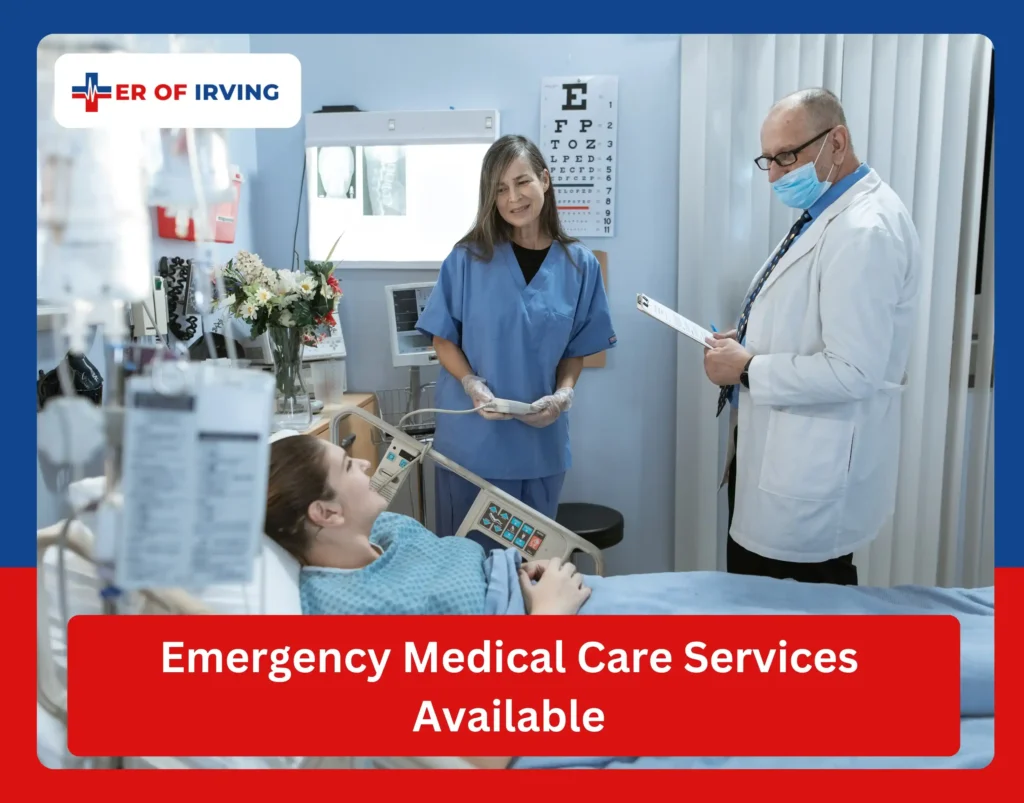Emergencies can be overwhelming, especially when you or a loved one requires immediate medical attention. If you are heading to an emergency room (ER) in Irving, TX, knowing what to expect can make the process less stressful. This guide will walk you through the ER admission process, emergency medical care, patient experience, and what services a 24-hour emergency center provides.
Understanding the ER Admission Process

When you arrive at an emergency room in Irving, TX, the first step is the check-in and triage process. This ensures that patients receive care based on the urgency of their condition.
- Registration—You will be asked for basic personal and insurance details. If the condition is life-threatening, medical care begins immediately before the paperwork is completed.
- Triage—A nurse will assess your condition, checking vital signs such as heart rate, blood pressure, and symptoms to determine how urgently you need medical attention.
- Waiting Area or Immediate Care—Depending on the severity of your condition, you may be taken to a treatment room immediately or asked to wait.
- Consultation with Medical Staff—An ER doctor or physician assistant will evaluate your symptoms and order necessary tests, such as X-rays or blood work.
- Treatment and Discharge or Admission—You may receive medication or minor procedures or be admitted for further observation or surgery if necessary.
Emergency Medical Care Services Available

Irving, TX, has top-tier 24-hour emergency centers offering a wide range of medical services. The most common include:
1. Trauma and Injury Care
Emergency rooms are equipped to handle severe injuries, from fractures and burns to head trauma and deep lacerations.
2. Heart-Related Emergencies
Symptoms such as chest pain, shortness of breath, or dizziness require immediate evaluation for conditions like heart attacks or strokes.
3. Pediatric Emergency Care
Parents can rest assured knowing that ERs in Irving, TX, provide specialized emergency medical care for children, including for fevers, respiratory issues, and allergic reactions.
4. Respiratory Distress and Asthma Attacks
ERs are prepared to provide oxygen therapy, nebulizers, and medications for breathing difficulties.
5. Neurological and Stroke Symptoms
If you or someone you’re with experiences sudden confusion, slurred speech, or paralysis, ER staff will perform immediate neurological assessments and treatments.
6. Severe Infections and Sepsis
Bacterial infections that spread throughout the body require IV antibiotics and hospitalization in some cases.
What to Bring to the ER

To streamline your ER visit and receive faster treatment, consider bringing:
- A list of current medications and allergies
- Health insurance card and identification
- Medical history details (if applicable)
- Emergency contact information
- Any previous medical records or lab results, if relevant
Understanding Wait Times at the ER
One of the most common concerns for ER visitors is the wait time. Several factors influence how long you may have to wait:
- Triage Priority: Life-threatening conditions are treated first.
- Current ER Patient Volume: The number of patients at the time of your arrival affects wait times.
- Availability of Medical Staff: The hospital’s resources and staffing levels also impact waiting durations.
On average, patients with non-critical conditions might wait anywhere from 30 minutes to several hours, while urgent cases are attended to immediately.
Patient Experience: What Happens During Your Visit?
Understanding the patient journey can help ease anxiety when visiting an emergency room in Irving, TX.
- Initial Examination—A nurse or doctor will conduct a physical examination and discuss symptoms.
- Diagnostic Tests—Depending on your condition, tests such as CT scans, MRIs, blood tests, or ultrasounds may be ordered.
- Treatment Plan—The ER team will develop a treatment plan, whether it involves medication, procedures, or hospitalization.
- Follow-Up Care Instructions—If discharged, you’ll receive clear instructions on home care, prescriptions, and when to seek further medical attention.
24-Hour Emergency Centers in Irving, TX

Many hospitals and standalone emergency centers in Irving operate 24/7, providing accessible emergency medical care at any time of day or night. These facilities ensure:
- Shorter wait times compared to traditional hospital ERs
- A full range of emergency treatments
- Specialized care for different medical conditions
When to Visit the ER vs. Urgent Care
Here’s a quick comparison to help you decide:
| Condition |
ER Visit |
Urgent Care |
| Severe chest pain |
✅ Yes |
❌ No |
| High fever in infants |
✅ Yes |
❌ No |
| Sprains or minor fractures |
✅ Yes |
✅ Yes |
| Cuts requiring stitches |
✅ Yes |
✅ Yes |
| Mild flu symptoms |
✅ Yes |
✅ Yes |
If in doubt, it’s always safer to go to the ER, especially for symptoms that could be life-threatening.
Final Thoughts
Knowing what to expect at the emergency room of Irving, TX, can help alleviate stress during medical emergencies. Understanding the ER admission process, emergency medical care services, and patient experience ensures a smoother visit. Whether it’s a standalone 24-hour emergency center or a hospital ER, being informed can make all the difference when seeking urgent medical care.
Call Now Get Direction
Frequently Asked Questions (FAQs)
What is the ER admission process at an emergency center in Irving, TX?
The ER admission process begins with a quick check-in, followed by a triage assessment where medical staff evaluate the urgency of your condition. Patients with severe symptoms receive immediate attention, while others may have a brief waiting period based on the severity of their cases.
What types of emergency medical care are available at a 24-hour emergency center in Irving, TX?
A 24-hour emergency center provides immediate care for conditions like heart attacks, strokes, severe injuries, and breathing difficulties. It is fully equipped with advanced medical technology and experienced physicians to handle life-threatening emergencies.
How does the patient experience at an emergency room in Irving, TX differ from urgent care?
Unlike urgent care clinics, emergency rooms in Irving, TX, are open 24/7 and handle critical conditions requiring advanced treatment, including trauma care, imaging, and specialist consultations. ERs prioritize life-threatening cases, ensuring patients get the care they need promptly.
What should I bring when visiting the emergency room in Irving, TX?
To streamline the ER admission process, bring a valid ID, insurance details, a list of medications, and any relevant medical records. This helps medical staff provide faster and more effective treatment.
How long does a typical ER visit take at a 24-hour emergency center?
The duration of your ER visit depends on the severity of your condition and the number of patients in need of emergency medical care. Life-threatening cases receive priority, while non-critical cases may involve a short waiting period before receiving treatment.
